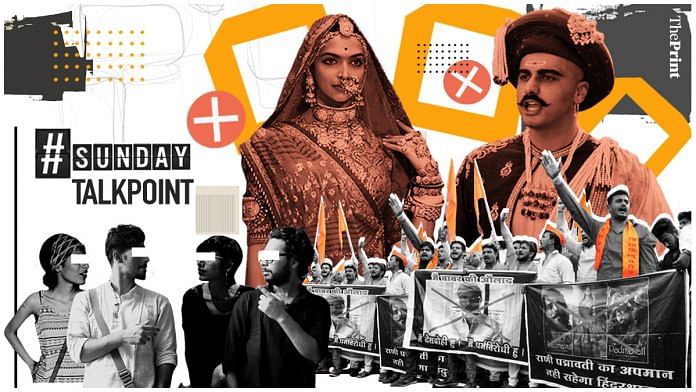Ashutosh Gowariker’s film ‘Panipat’ has provoked controversy for its “unseemly” portrayal of Maharaja Surajmal. People protested in Bharatpur and Bikaner against the movie’s alleged distortion of history. Rajasthan Tourism Minister Vishvendra Singh has demanded a ban on the movie and former chief minister Vasundhara Raje also expressed her displeasure. Other period dramas like Jodhaa Akbar, Padmaavat also met with trouble.
ThePrint asks: Panipat to Padmaavat: Can Bollywood make historical drama without hurting sentiments?
Bollywood films on historical events deliberately portray content that hurts people
 Krishan Murari
Krishan Murari
Trainee Journalist, ThePrint
I’m sure all of us have grown up watching Hindi films that have in some way or the other left an indelible impact on our childhood memories. Bollywood filmmakers understand this reality and keep it in mind while making movies.
But content creators face a host of problems, especially when they make period dramas. Everyone has a different understanding of history in society. So, there is a deliberate attempt to connect viewers with historical events by using cinematic elements and content that arouse strong sentiments.
This explains why people who saw films like Panipat and Padmaavat did not remain untouched by what the filmmakers depicted. The protests against these films can be seen from different perspectives. First, films made on historical events are deliberately portrayed in such a way that people are either emotionally hurt or vehemently disagree with it. Second, it is the work of some bigots who mischievously try to create misconceptions about period drama films.
It is also the responsibility of filmmakers to increase public consciousness of historical and social events. This responsibility rests even more with period dramas. In order to escape from the labyrinth of historical facts, films are given a dramatic appearance.
Bollywood is churning out period dramas year after year, and these have become an easy way of minting money. This is not to say that such films don’t make history more entertaining for the average Indian. But money matters in a globalised world, even if it is raised by hurting emotions.
It’s mainly groups like Karni Sena and Hindu Sena that claim Bollywood period dramas hurt sentiments
 Revathi Krishnan
Revathi Krishnan
Journalist, ThePrint
On questioning whether Bollywood can make historical dramas without hurting sentiments, one is also tempted to delve into a serious argument about research and representation of historical figures and communities in cinema and what they mean today.
The truth of the matter is that claiming a betrayal of sentiments, threatening to cut a person’s nose or obstructing movie screenings have become a sport for many. A sport that extends beyond expressing outrage over the representation of historical events.
In the past, we have seen that those who have claimed their sentiments have been hurt are mostly fanatics — members of Karni Sena, Hindu Sena and Hindu Mitra Mandal. It is people like them who come down heavily on films like Bajirao Mastani, Padmaavat and Jodhaa Akbar. Though they claim to be protectors of Indian history and culture, one is doubtful whether these zealots themselves know anything about history.
It should be understood that a writer or director has to take a huge mantle of responsibility while illustrating certain events from history. Therefore, one is right to question and castigate a filmmaker on the representation of Afghans in Panipat or even Padmaavat, or whether Jodha bai was actually Akbar’s wife or daughter-in-law.
However, we are currently living in times where we are constantly trying to rewrite who actually won the Battle of Haldighati and claim V.D. Savarkar was a ‘patriot’.
The ‘don’t-hurt-sentiments’ argument now seems paltry when using it for historical dramas and is a lot more pertinent when we question how filmmakers represent Muslims in movies, why most heroes are upper-caste Malhotras or Sharmas and why we glorify toxic relationships through the lens of Kabir Singh or Arjun Reddy.
Recent Panipat controversy shows people think there’s only one ‘correct’ version of a historical event
 Kairvy Grewal
Kairvy Grewal
Journalist, ThePrint
I think the words ‘historical drama’ bring out the irony in the question itself. Sentiments of certain communities are hurt only when history is viewed as a collection of facts and narratives that can’t be contested.
The recent controversy fuelled by Panipat’s alleged ‘mistaken portrayal’ of Maharaja Surajmal indicates that people assume there was one ‘correct’ version of that event to begin with. Apart from the fact that one wouldn’t would watch Bollywood movies just to take a lesson in history, it must be noted that history isn’t just a sequence of events lined up. History must be viewed as a series of interpretations. The singularity surrounding our opinions on history doesn’t just confine the expanses of India’s rich history but is also grossly unfair.
It is these faulty perceptions that have led to people fighting over the ‘correct’ understanding of historiography. However, it is equally true that an understanding of these multiple interpretations can help curb conflict and contestation.
The onus is on the audience to realise that neither a movie’s version of a historical episode can have the final say nor its own knowledge of that event can. Moreover, there have always been different opinions about another perception that history is always written by the victors.
At the end of the day, these movies are merely dramatised versions of history and should only be seen in that light.
Viewers should know that Bollywood period drama films sell an experience rather than a history lesson
 Pia Krishnankutty
Pia Krishnankutty
Journalist, ThePrint
Deepika Padukone’s character committing sati in Padmaavat was bound to be controversial, but Bollywood presenting such scenes is not surprising.
One can argue that period drama films in 2019 should at least attempt to be historically sensitive and account for all the complexities of Indian history before depicting it, but that’s also a lot to ask of Bollywood films.
Most Hindi films usually cater to the masses rather than a niche audience and more often than not, shock-value scenes, dramatisation and glamour trump historical accuracy. Movies like Panipat or Padmaavat aren’t low-budget films — they’re blockbusters that invest in famous actors, flamboyant sets and splendid soundtracks. They sell an experience rather than a history lesson.
Jodhaa Akbhar and Lagaan reflect these same elements of drama and they quite understandably narrativise history to stir emotions. One can always argue that certain elements are deliberately used, part of cinematic aesthetics in general, for the provocation of viewers.
That’s not to say that audiences shouldn’t be offended by scenes like Deepika’s in Padmaavat, but they shouldn’t expect Bollywood to be as politically sensitive as say, a documentary.
Commercial films shouldn’t be taken too seriously
 Manas Gurung
Manas Gurung
Senior video producer, ThePrint
Historical dramas have always been a cause and concern for filmmakers and audiences alike, especially in a socio-politically sensitive country like India. Many writers and artists have interpreted history and played with it in their own ways. Bollywood films like Lagaan, Pinjar, Hey Ram, Mughal-e-Azam, Earth, Gadar and even Baahubali are significant examples of good cinema.
I think depicting history through a cinematic medium is always a treacherous path to tread on. Recent films like Panipat and Padmaavat may not be the best examples but a few bad ones should not be the benchmark for criticism of other period dramas.
I also feel that this is a case about representation of identities. Moreover, filmmakers have the absolute right to think out of the box and exercise their creativity in ways they deem suitable. I don’t see any other way in which one could draw crowds and make these films a commercial hit.
It is also important to realise that without good period dramas, there would have been a dent in Indian cinema. It would lead to a vast expanse of avenues being unexplored in the film industry.
At the end of the day, commercial films shouldn’t be taken too seriously.
Also read: Forget battle over the film, Panipat is at the heart of 3 battles that shaped our history
By Kairvy Grewal, journalist at ThePrint




When rule of law is weak, tribal culture prevails.
I don’t think historical films or novels can depict history correctly. There is always a temptation to glorify the central character of the story and the script is so structured to hide the character’s weaknesses and blunders/errors. The most stupid thing is to show these characters singing and dancing in Bollywood style. So, we are shown Bajirao-I dancing ‘Wat lavali’ or his grandson Bajirao-II singing a patriotic song in Manikarnika- it is so comic that it looks that the film-makers are absolutely ignorant about history. When it is shown that Bajirao-I’s wife Kashibai dancing along with Mastani it becomes a laughing affair, because in actual history due to health problems Kashibai, a mother of three children, was not able to even walk properly, forget dancing. Then, we have a phenomenon of historical figures becoming icons community or region-wise. That community will not accept anything adverse being portrayed about its icon. Furthermore, controversies are deliberately raked up either to blackmail producers or to give them backhanded publicity. So, forget films, if you are serious about history read history books. For example, for the third battle of Panipat read the most authentic versions by T.S.Shejwalkar (Panipat 1761), Sir Jadunath Sarkar (The Fall of Mughal Empire-Vol 2) or J.L.Mehta ( Advanced Study in History of Medieval India).
Corrections: Kashibai was mother of four children not three, out of which two died prematurely. She was suffering from arthritis, so dancing was out of question. Sorry, Priyanka Chopra.
Aap vidvaan hain. Sir Jadunath Sarkar ko recommend karte hain. Yahan par toh WhatsApp University ka daur hai.
I don’t think a sensitive Director sets out to deliberately hurt sentiments. There are shades of grey to many historical characters and events. That becomes a little difficult to accept in a nation which is busy writing a sanitised version of its history. A small, fierce group of protestors is enough to persuade the state government to intervene, on the side opposite artistic freedom.
It is bound to hurt sentiments as film obviously will be from Maratha or new Hindutva point of view trying to cash on the newly found enthusiasm. To know what Hindus did to Hindus just Google Maratha invasions of Bengal.